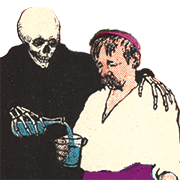|
When Hegemony was first announced, it piqued my interest. But the first thing I saw when looking into its approach to the subject matter was someone essentially asking on BGG "Where's communism?" and one of the designers answered with basically, "It's too effective so we left it out to be fair to the capitalists and bourgeoisie players. Reform is revolution." So I kind of wrote off its politics.Varnavas Timotheou posted:Indeed, it was a bit tricky to implement pure Marxism as its goal, the establishment of a socialist society and the transition towards communism would render the game unplayable for at least one of the players. Meaning that if, for example, the state would adapt this framework, private businesses would not exist anymore as the means of production would be state-owned. Hence, the capitalist class would not be able to participate in the game and the middle class would lose its small-businesses and it essentially would become a cooperative game between the state and the working class (which sounds fun, but would simply not make sense in our game). As our goal was to let all players stay in the game until the end, we decided not to implement this option and, alas, had to keep the capitalist framework as the underlying socio-economic system. However, we implemented a lot of de-facto socialist policies (e.g., an expanded welfare state, free health and education, the option to nationalize private businesses, extensive labor regulation and so on) and gave the working class a lot of actions such as strikes, labor movements, student protests which can be regarded as “direct action” by the left. If played right by certain players and played wrong by others, the nation could actually become borderline socialist with only little missing for its final form. Therefore, we adapted Gramsci´s “war of position” approach which would entail the creation of a counter-hegemony not through dramatic coup d’états (which in our western societies would be almost impossible given the fact that the cultural hegemony of capitalism is deeply engrained in civil society), but instead, through gradual changes which are a form of revolution in itself. Full disclosure: I edited the expansions and solo version of the game. The designers seem like nice, well-educated guys, but personally, a politically minded, asymmetrical boardgame explicitly all about class struggle that just doesn't even account for worker revolution or communism is just a nonstarter for my tastes. Cole's/Wehrlegig Games's approach to political and historical games is increasingly becoming my standard for assessing tabletop games on this axis.
|
|
|
|

|
| # ¿ May 12, 2024 00:43 |
|
Triskelli posted:Though maybe how every war movie romanticizes war in some way, maybe there can’t be a game where you play colonizers that doesn’t romanticize colonialism in some way. 1) The way the storyteller actually tells the story makes the fantasy too exciting or enticing (in film, it's often about cool characters, slick and stylistic direction/editing, exciting and/or triumphant action scenes, etc.). Sometimes it's completely unintentional, but sometimes the inclusion of these things is what gets a project funded because producers think the target audience needs them to enjoy the story (a sort of lowered expectations that forces most stories to be less and less subtle, nuanced, or complex). 2) Most audiences have poor media studies education and low media literacy and will simply not see or actively ignore subtext or even text that detracts from whatever they find exciting or engaging about the story. Most people seem to think the problem is almost entirely #1, and it is a big issue. But as time goes on, I think #2 is actually having a much bigger impact overall. Personal ideology and bias; the inability to grasp how storytellers inject their viewpoint, emotions, and ideals into a story; and the desire for media to be something you can "shut off your brain" to engage with (itself, in part, an outgrowth of capital's capture of the arts) all really kneecap media criticisms of power and inherently keep them from being too effective. Part of this issue is, indeed, the fact that the colonizing activities are what most designers seem to make "the fun part" of the game, with the criticism coming as a smaller "well, actually" realization near the end that dampens the excitement. I'm assuming this is largely due to the history of tabletop games, and hence its hegemonic viewpoint, being so rooted in games about conquest and colonization. But, ya know, that's much of Western ideology, unfortunately, so it takes a designer being very insistent and studied to consciously approach a game with that subject matter from a criticism-first angle, which I think is one big reason why I like Cole Wehrle's games so much.
|
|
|
|
Magnetic North posted:This comment makes me think it might be cool to have a game where the modules controlled by the classes can change between players. So, the ownership class starts with the Factories board among other things, but the state could nationalize them and take control of them, or the working class could seize them, etc. Moving around like a company charter in an 18XX game. Panzeh posted:I think it'd be really hard to make something like hegemony able to just, have radically different structures of how money goes around the board and still be much of a game. I kinda feel like the nod to communism is basically the Working Class having an advantage in a 'multiplayer solitaire' style of play. Your mileage may vary. Raenir Salazar posted:There was a colonialism game I played that just put the players as the natives with the settlers being essentially "AI" controlled via drawing cards from their deck and implementing their "moves" that was kinda neat.
|
|
|




